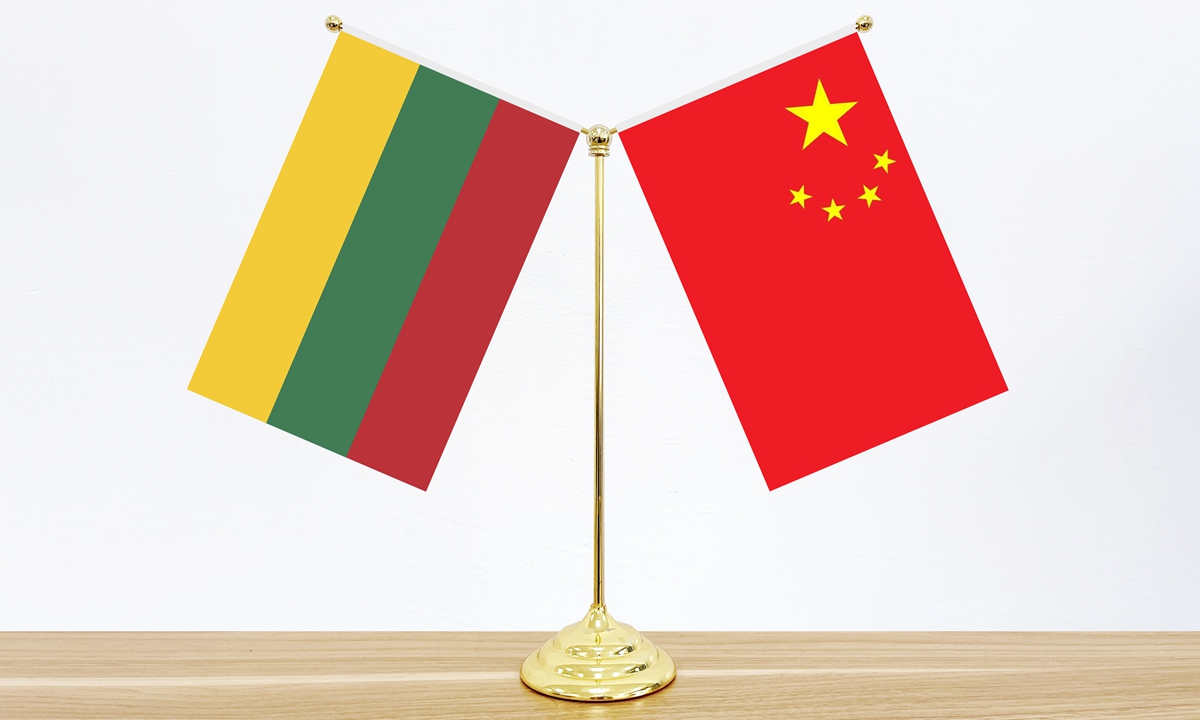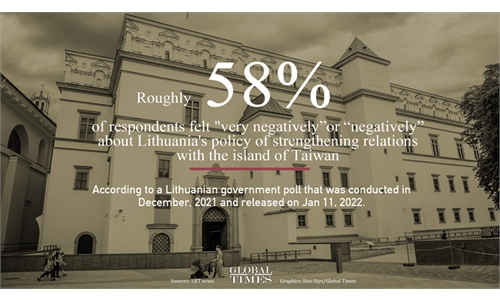Lithuanian government has made wrong decisions in worsening ties with China: opposition leader

Photo: CFP
Editor's Note: Some observers say China and Lithuania once had a "honeymoon period" with relatively frequent official goodwill visits between the two sides. But since last year, the bilateral relationship took a nosedive after the Lithuanian government allowed the Taiwan authorities to set up a "representative office" in Vilnius. Ramūnas Karbauskis, chairman of the Lithuanian Farmers and Greens Union, a main opposition party in Lithuania, has called the move "unprofessional and irrational." What makes him think that? Karbauskis shared his views with the Global Times reporters Li Aixin and Bai Yunyi in a written interview.
GT: You criticized the "unprofessional and irrational" opening of the office. Could you elaborate more on your views about this move by the Lithuanian government? What has the opening of the office brought to Lithuanian national interests? And which industry has it affected the most?
Karbauskis: Lithuania has signed international treaties, including ones with China. Lithuania agreed that the People's Republic of China is indivisible and has developed economic and cultural cooperation under agreed conditions. I do not question the need to develop cooperation with Taipei, but I see that an opportunity has been missed to do so without leaving the framework of the agreement with China. The consequences are being felt in many industries, from the laser business to wood processors. Some of the country's businesses and investors are frustrated and urgently need to find new solutions. I hope that the Chinese government understands that it is the Lithuanian government that has made the wrong decisions, not the people or businesses that are most affected by the problems in the China-Lithuania relations. Public opinion polls show that the majority of the Lithuanian people want good China-Lithuania relations and do not support the decisions of Lithuanian politicians that would worsen them. I hope the Chinese authorities will take this into account when making decisions regarding Lithuania.

Photo: Courtesy of Ramūnas Karbauskis
GT: There has been opposing views over the representative office. You oppose it. The President opposes it. And Lithuanians overwhelmingly oppose Vilnius' hardline policy on China, according to a recent poll. What does this growing opposition mean?
Karbauskis: People in Lithuania see which politicians are working based on values and their actions are aimed at fostering peaceful relations. People can also see their mistakes, so whether this government has lived up to their expectations, or whether it has been right with its decisions, will be best determined by elections. It is now essential to build rather than destroy bridges between countries and to find diplomatic ways to resolve conflicts. Likewise, we do not want the respect and prestige that Lithuania has earned over three decades to be lost in the international arena.
GT: Will worsening ties with China affect Lithuania's relations and trade ties with other countries, both within and outside the EU?
Karbauskis: I believe that relations between the two countries will not change (in a further worsening direction) but I do believe that there are major grievances about the collapse of business plans and the business route that went through Lithuania. Consistency is the greatest expectation of countries, people, and businesses alike.
GT: Most of the European powers are trying to keep a balance between China and the US. Why did the Lithuanian government take this radical step in ruining relations with China? Do you think other countries may follow?
Karbauskis: Time will tell whether there will be others following in the footsteps of the Lithuanian government. However, so far, we are seeing the reverse happening, especially in our neighboring countries. Poland and Estonia are seeking new diplomatic solutions.
GT: What role do you think the US has played in the escalation of the row between China and Lithuania?
Karbauskis: I would not like to believe that there are any agreements that put Lithuanian business and economy at risk. It would be more beneficial for Lithuania to maintain good relations with both China and the US. I am an advocate of compromise and friendly relations between countries, especially if it is good for our country.
GT: Some politicians in Western countries, including some from Lithuania, are calling for a diplomatic boycott of the Beijing Winter Olympic Games. What are your views on this move? Against the backdrop, a Lithuanian delegation is coming to Beijing Winter Olympic Games to compete. What signals does this send?
Karbauskis: In my opinion, the Olympic Games are above political intrigue and strife. After all, that is their essence. The athletes have worked hard throughout the years to achieve their goal in their sporting careers and in their lives to compete at the Olympic Games. National Olympic Committees are not political organizations. They are guided by the International Olympic Charter and this is signaled, as you say, by the fact that Lithuanian athletes are going to the Olympics.



